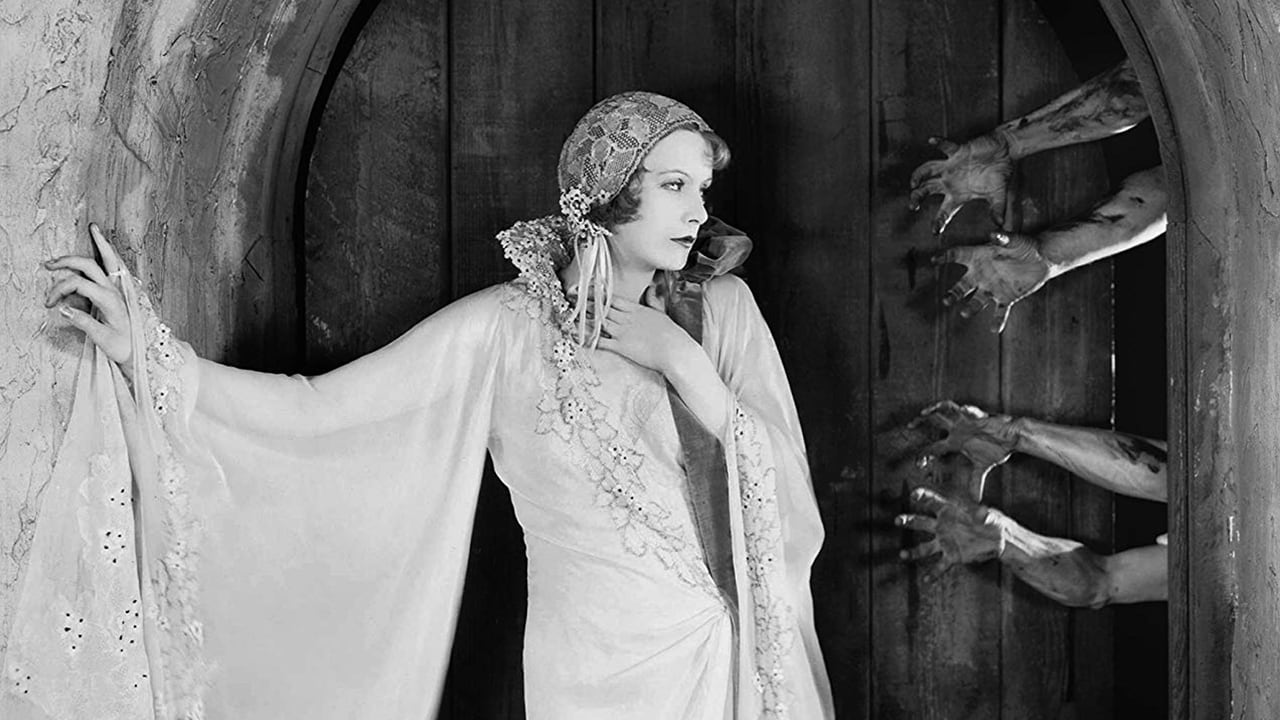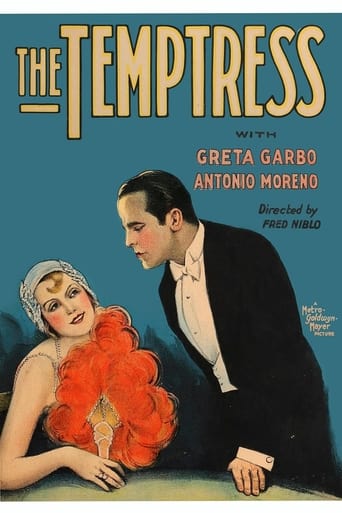

In his novel 'La Tierra de Todos' (The Land of All), the Spanish author Vicente Blasco Ibáñez sets up the mind ( personified by an architect) against the body (the beauty of the temptress), and, social order (a workforce to build, here, a dam) against anarchy (a renegade leader and his band). For the author, males who fight with their bodies against (young) female bodies are condemned (go bankrupt). The architect (Order) fights also against the band leader (Anarchy) in the Argentine way: with a whip in an arena in the form of a circle. Based on this novel, Fred Niblo shot a most memorable movie with spectacular scenes (the destruction of a dam), brutal bloody fights, a masked ball and, most impressive of all, the heavenly (satanic) beauty of a young Greta Garbo. Will the body (the temptress) vanquish the mind? The ultimate encounter between the two doesn't turn into a happy end. This movie, with Greta Garbo in one of her best roles, is a must see for all film buffs.
... View MoreThe movie has flaws, but one of them is not an old fashioned attitude toward women. The opening quote says "God and man created woman." That is to say, our perception of women is from men's point of view. But this film presents a beautiful woman from her own point of view (and the film's). We see a woman not only bearing moral blame for the actions and choices of men, but also being prevented from a fulfilling life by her beloved's obsession with his own desire. The most telling line Garbo has in the film begins something like, "They don't want me; they want my body. And they don't care about my happiness. It is for their own." And indeed not one man in the film sees her as anything but a fulfillment of his own desire, even the Moreno character, capable as he is of great heroism and dedication. He remains a run of the mill guy when it comes to women. She has no existence as a personality for any of these men. In the end our "hero" is left to deal with his conscience, as Garbo's character emerges as the only one in the drama with real substance. Look at Ibanez's biography and at his progressive sensibilies, which both of the film's directors apparently shared.
... View MoreTHE TEMPTRESS (Metro-Goldwyn-Mayer, 1926), personally directed by Fred Niblo, from the novel by Vicente Blasco-Ibanez, stars Swedish actress Greta Garbo in her second Hollywood production, following her American debut in THE TORRENT (1926), and the first to place her name on top of the casting credits. As with her MGM debut, Garbo plays a girl of Spanish origin (this was the last to do so), and like so many films that were to follow, especially during the silent era and early talkies, she would portray a woman (usually unhappily married) who satisfies her emotions with illicit affairs, finding the one man she truly cares about, and destroys those around her before reaching bottom herself, committing suicide, or both. THE TEMPTRESS would set such a pattern.The story opens in Paris at a masquerade party where the unhappy Elena (Garbo) meets Manuel Robledo (Antonio Moreno), an Argentine engineer. After removing their masks, they fall in love under the stars. Later when he comes to visit his friend, Marques De Torre Bianca (Armand Kaliz), Manuel is stunned to learn that his wife happens to be Elena. At the dinner party, Marquis Fontenoy (Marc MacDermott), a middle-aged banker permitted by Bianca to have Elena be his mistress in order for them to be financially secure, distracts the guests by making a startling speech on how Elena, the temptress, has ruined his life, and dropping dead at the table after taking his drink of poison. Disgusted by the ugly truth, Manuel decides to forget Elena by leaving for the Argentine where he accepts a water dam building project. Just as Manuel is slowly forgetting Elena, she arrives with her husband, and by doing so, causes frustration and destruction to both men, and others as well, with Manuel, who feels she to be responsible for the murder of his friend and husband, as well as the near destruction of his dam dynamited by his enemy, finds he still cannot resist her.The supporting players include Lionel Barrymore as Canterac, one of the construction workers who falls victim to Elena; Robert Anderson as Pirovani, the friend Canterac kills because of Elena; and Virginia Browne-Faire as Celinda, the pretty young girl who silently loves Manuel. Adding to sin and destruction is Roy D'Arcy as Manos Duros, the bandit leader, in a menacing performance as Manuel's arch enemy who, after forcing his intentions on Elena, is challenged by Manuel to a duel, with the bandit's method being the use of whips. The bull whip duel is one of the high points in the story, resulting to whip scars on the bare torsos covered with blood, as well as Manos, who fights dirty, aiming for the eyes, being quite graphic for its time.THE TEMPTRESS, an important project that helped advanced the screen career of Greta Garbo, at long last, premiered January 24, 2005, on Turner Classic Movies cable channel, accompanied by a new score composed by Michael Picton. Scoring a silent movie is challenging, as mentioned in the half hour special that preceded the movie, and minutes into watching THE TEMPTRESS, the result of Picton's work is satisfactory and rewarding. In spite the fact that host Bob Osborne announced THE TEMPTRESS as making its world television premiere, it actually did play on television, but many years ago. THE TEMPTRESS was one of the selected 13 silent films shown weekly on the public television series in commemoration of MGM's fifty years titled "Movies-Great-Movies," (WNET, Channel 13, in New York City from August to October of 1973) hosted by Richard Schickel, movies accompanied by an an orchestral score (and in the New Jersey area as part of the 1974 series, "Films of the Gatsby Era," with same movies, different hosts, on WNJM, Channel 50). THE TEMPTRESS, which premiered in New York City August 13, 1973, made its final TV run on WNET in May of 1978 as part of the double bill five week movie tribute to Garbo and Katharine Hepburn. Schickel, as did Osborne, talked about how Garbo's discoverer, Mauritz Stiller, started out as the film's director, but due to complications during production, was replaced by Fred Niblo. The information regarding THE TEMPTRESS remains the same, with the exception of its time length. When shown in the 1970s, the running time was about 114 minutes. TCM's print runs at 105. But regardless of its length, possibly due to projection speed, THE TEMPTRESS is a welcome addition to the TCM lineup, and well worth viewing again after many years or the first time ever. While THE TEMPTRESS belongs to Antonio Moreno, whose name is almost forgotten today, it owes its success to the temptress herself, Greta Garbo, which is the sole reason for its rediscovery. (***)
... View MoreAt 117 minutes this is way too long and ought to have been cut by half an hour. It was Garbo's second MGM film, and like the first, was derived from an Ibanez novel. Ibanez, as a source, proved beneficial for Valentino (THE FOUR HORSEMEN OF THE APPOCALYPSE), but not for Garbo. For most of the film, she just stands around and does what she is good at, enticing men to make fools of themselves over her - and wouldn't you know it, they then blame her! Her weakling husband sells her to a banker, who ruins himself for her and commits suicide. The husband is shot by a bandit. Two friends of the main character vie for her and one kills the other. Our hero keeps vascillating, he loves her but hates her for ruining men's lives. She, like most women of her type, lived as best they could - in a man's world, a plaything, she survived as a courtesan, securing jewelry for her support. Yes, she is weak, but she is not to blame.The second half of the film is set in the Argentine where our hero has gone to build a dam, which the villain blows up, but which our hero rebuilds.Garbo does have one stunning outfit - a slinky black thing, edged in white ermine with an orchid pinned over her right breast.Garbo DOES get to act but only in the last sequence. Back in Paris, a successful architect, Antonio Moreno encounters the fallen Garbo, who drunkenly does not remember him -"I meet so many men." It is of course a lie, but one to make him forget her. Mistaking a fellow drunk for Christ, she gives him a ruby and wanders off into the sunset. Garbo is quite fine in this sequence but it is the only thing of value in the film, which is turgidly and boringly directed by her mentor, Mauritz Stiller (who was fired from the project part way through) and Fred Niblo (who completed it and got sole credit).The cinematography contains two interesting silhouette shots, an amusing "under the table" sequence at a dinner party where men and women's legs and feet engage in some risque flirting - and the ubiquitous MGM long banquet table tracking shot (we'll see it again in ANNA KARENINA, not to mention a number of other MGM films.)This one plays on Turner Classic Movies occasionally and is worth catching for Garbo alone. It has never been released commercially on video (one of only three Garbo silents which have not - we wonder why).
... View More